Minimalism is a lifestyle choice but what are the benefits? How does minimalism affect mental health? Can minimalism improve mental health?
After announcing my 21 Day Minimalism Challenge, I started to wonder how being a minimalist affects us mentally, emotional, and physically. We've heard time after time that clutter can cause many health risks but having a full home doesn't necessarily mean you live in clutter – so I want to really break down the affects of having less stuff and a less complicated lifestyle.
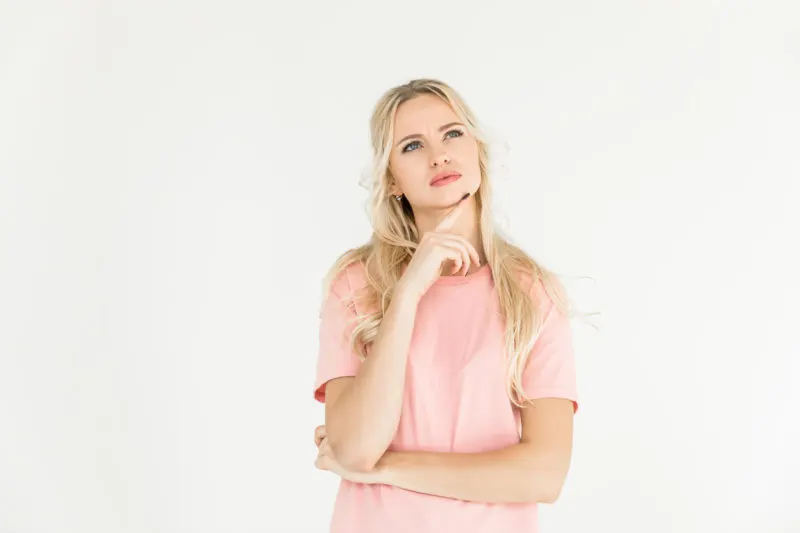
Additionally, I want to share exactly how minimalism can improve mental health, including a few steps you can take to get yourself to a healthy mental state.
How Does Minimalism Affect Mental Health?
First, it's important to understand that minimalism is another word for living a simplistic life. This means less stuff in your home and less stuff in your brain.
Wait, what?
That's right, being a minimalist isn't just about emptying drawers and spending less – it goes much deeper.
The best way to describe the positive impacts of a being a minimalist, you must first see how having too much equals to less overall life joy. Let's begin here:
Signs the minimalist lifestyle would benefit you:
By identifying these specific signs, you'll begin to see how doing it all and having it all can negatively impact your life. If you relate to a few of these signs, or maybe all of them, you could really benefit from a simplistic lifestyle.
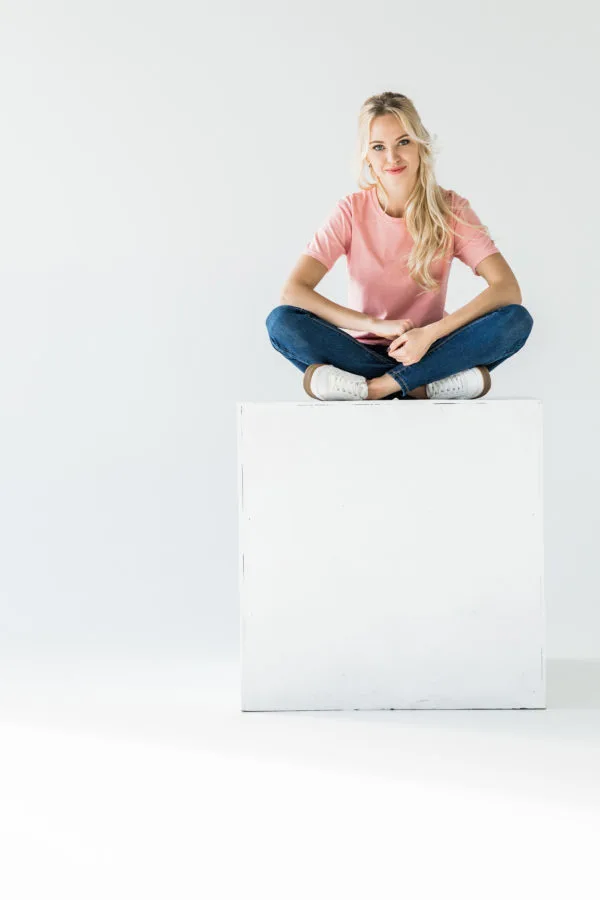
1. New things only give you instant satisfaction – not lasting.
Maybe it's the thrill of the hunt that satisfies you. You've been searching for that exclusive collectible for the past few weeks and now you've finally got your hands on it. You're over the moon with excitement.
Then, you put it on a shelf and never think about it again. That satisfaction you felt isn't lasting because material things don't truly give you joy.
2. The stuff in your home stresses you more than it pleases you.
Likewise, you may find yourself walking through your home, looking at all the things you purchased to give yourself life satisfaction.
You see the collection of dishes you'll never use, the 15 throw pillows on your couch, and knick knacks in every nook and cranny. Rather than smiling, you find yourself overwhelmed by all of the stuff. You think of the clutter, the additional cleaning, and the lack of space.
If you're experiencing more stress than happiness because of the stuff in your home then I recommend considering a less materialistic lifestyle.
3. Your mind feels clouded with obsessive compulsive tendencies.
Feeling obsessive compulsive tendencies in regards to your lifestyle is fairly common for those of us who live an overwhelming life.
If something being out of place sets you into a panic or you find yourself absolutely needing a specific item whenever you see it in the store – this is for you.
Obsessive compulsive tendencies and hoarding actually go hand in hand with many individuals, as expressed in this Reddit thread. With that said, allowing yourself to let go of the need for things to be perfect will help you to live a life that is more fulfilling and less demanding.
4. You often feel like you're doing too much.
This is especially true for parents but I know many others can relate to feeling like you're doing way too much all the time. These are a few signs that you're doing way too much.
- You don't “have time” for leisure activities.
- Many days you find yourself in a stress-induced panic because you may not get everything finished on your to-do list.
- Your immune system has become weak.
- You're missing out on meaningful things, like weddings or birthdays, because your schedule is too full.
- You fear becoming ill because you think everything will fall apart.
Minimalists don't try to do it all. They take a more laidback approach to life, many times, letting life happen to them rather than planning everything.
5. It's easy for you to overspend or spend more than you have.
When you want something you've just GOT to have it. You cannot wait or save to get it. Be honest with yourself. If this is you – then it's time to consider a lifestyle chance.
6. You're no longer happy with the gifts you receive from others.
I can personally attest to this. I used to get a little tingly feeling when I received gifts but now, I just don't appreciate them like I should. One reason is because of how detached I've become from material things. When you have too much nothing seems to fill that void.
By living a minimalistic lifestyle you'll either experience a much greater appreciation for gifts or you'll begin asking friends and family to skip the gifts. Either way, you'll start to notice how minimalism improves your mental health!
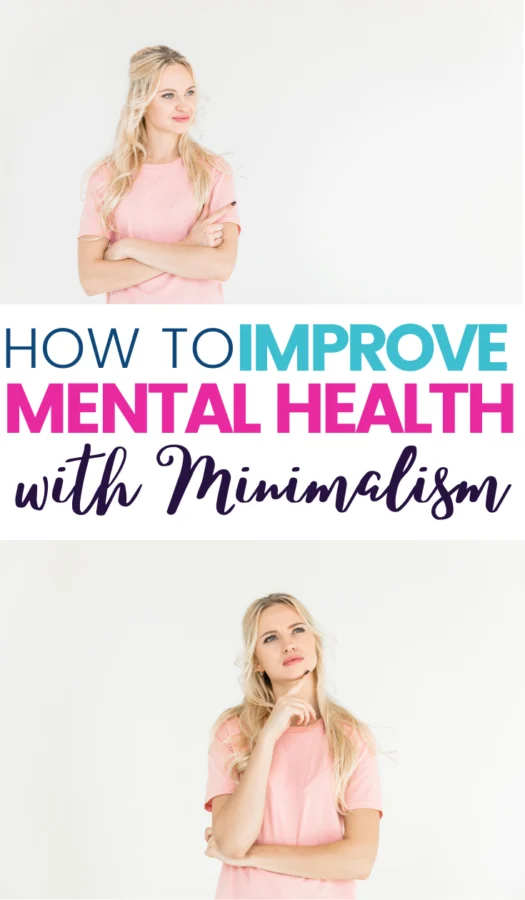
7. You have trouble enjoying the simple things in life or you become bored easily.
Also, you may find yourself not really appreciating the simple things in life. If boredom comes often, then a new lifestyle choice is a good idea.
An example is sitting at the playground with your children but steadily staring at your watch or you phone. Rather than enjoying the weather and watching your children play, you're wishing you were somewhere else.
Minimalists tend to partake in activities that allow them to appreciate the little things, such as, meditation, coffee dates with friends, picnics, or quiet walks.
8. It's often difficult to relax and rest.
Do you have trouble resting and relaxing because your mind is elsewhere? That's probably because you're allowing too many things to cloud your brain. You have too much going on and cannot seem to clear your mind.
9. You don't enjoy being home.
Whether it be the clutter or the boredom, being home doesn't feel like a sanctuary to you. There's either too much stressing you out or you find it just plain boring.
10. People have made comments about your spending or the things you own.
If friends and family make comments about how much “stuff” you have, how much money you spend, or even how busy you are – you may have a problem that needs to be fixed.
11. You always want more.
Nothing is ever enough for you. You always find yourself wanting more, more, more. From collecting items to eating food – one is never enough.
I used to feel this way. If I liked something, let's say a shirt for example, I had to have it in every color. If I liked a new home decor collection, I felt as if I needed everything in that collection.
All of these feelings lead to overspending and compulsive behaviors. Plus, my house become overly cluttered which lead to extreme overwhelm on my part.
12. Addictions come easily for you: eating, shopping, sex, substance abuse, etc.
Finally, addictions of all kinds can be a sign that you are in serious need of a lifestyle change. This goes right along with never having enough of something. A little bit doesn't satisfy you. Ordinary life doesn't please you.
These are a few reasons being a minimalist could be the right choice for you.
How Being a Minimalist Can Improve Mental Health
Next, let's talk about the impacts of stuff on our mental health. There are many reasons people choose a minimalistic lifestyle but some of the most common reasons involve saving money or personal growth.
In this post, I'll be focusing on the personal growth aspect of minimalism and how being a minimalist can improve mental health.
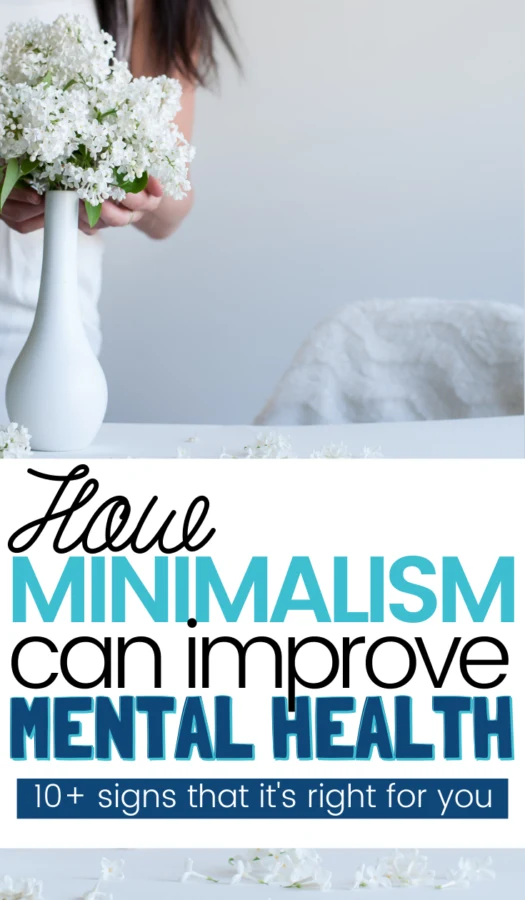
If you've fully read up until this point, you can already see the negative impacts of stuff on your mental health.
So let's talk about how clearing the stuff from your life can better your lifestyle:
- Decreases anxiety and depression.
- Allows you to enjoy the simple, yet important things in life. Removing the “junk” from your life leaves room for the nice things.
- Leaves more room for self-care and free time.
- You'll find yourself resting much easier.
- Spending less means saving more for investments and vacations!
- Your stress levels will gradually fall and you'll find yourself becoming a much happier person!
- You appreciate what you have rather than worrying about what you don't.
- You'll find yourself reevaluating your friendships and relationships; removing the ones that no longer serve you.
- Your home will be your happy place again because you'll find yourself focusing on decluttering, cleaning, and maybe even investing in this space.
- Less worrying.
- More saying NO to things that don't benefit you.
When asked, “how does minimalism affect mental health?” the answer is clear: it affects mental health in a positive and happy way. Minimalism isn't obsessively worrying about having too much, it's about redirecting your focus to the important things in life.
The steps I've personally taken to simplify my life have made me a much better person. I am not where I want to be yet but I'm on the road to getting there. Once I complete the minimalism challenge, I should be in a much better headspace.
Start the 21 Day Minimalism Challenge today – and get your free printable checklist!
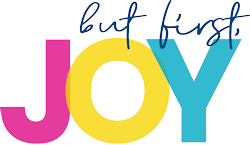
… [Trackback]
[…] Read More to that Topic: butfirstjoy.com/how-does-minimalism-affect-mental-health/ […]
… [Trackback]
[…] Find More Info here on that Topic: butfirstjoy.com/how-does-minimalism-affect-mental-health/ […]
… [Trackback]
[…] Info to that Topic: butfirstjoy.com/how-does-minimalism-affect-mental-health/ […]
… [Trackback]
[…] Find More Information here on that Topic: butfirstjoy.com/how-does-minimalism-affect-mental-health/ […]
… [Trackback]
[…] Read More to that Topic: butfirstjoy.com/how-does-minimalism-affect-mental-health/ […]
… [Trackback]
[…] Read More on that Topic: butfirstjoy.com/how-does-minimalism-affect-mental-health/ […]
… [Trackback]
[…] Read More on that Topic: butfirstjoy.com/how-does-minimalism-affect-mental-health/ […]
… [Trackback]
[…] Information on that Topic: butfirstjoy.com/how-does-minimalism-affect-mental-health/ […]
… [Trackback]
[…] Find More on to that Topic: butfirstjoy.com/how-does-minimalism-affect-mental-health/ […]
… [Trackback]
[…] Find More here on that Topic: butfirstjoy.com/how-does-minimalism-affect-mental-health/ […]
… [Trackback]
[…] Read More on that Topic: butfirstjoy.com/how-does-minimalism-affect-mental-health/ […]
… [Trackback]
[…] Read More on that Topic: butfirstjoy.com/how-does-minimalism-affect-mental-health/ […]
… [Trackback]
[…] Read More on that Topic: butfirstjoy.com/how-does-minimalism-affect-mental-health/ […]
… [Trackback]
[…] Read More to that Topic: butfirstjoy.com/how-does-minimalism-affect-mental-health/ […]
… [Trackback]
[…] Find More on on that Topic: butfirstjoy.com/how-does-minimalism-affect-mental-health/ […]
… [Trackback]
[…] Find More here to that Topic: butfirstjoy.com/how-does-minimalism-affect-mental-health/ […]
… [Trackback]
[…] Information to that Topic: butfirstjoy.com/how-does-minimalism-affect-mental-health/ […]
[…] Overspending to distract yourself or feed into a false need for something. […]
[…] the things in a person’s home. It’s more so a simple way of living. Because of the positive affects of minimalism to mental health, it’s much deeper than clearing […]
[…] has been known to increase joy in one’s life by decreasing anxiety and stress. Minimalists tend to enjoy the deeper things in life because they […]